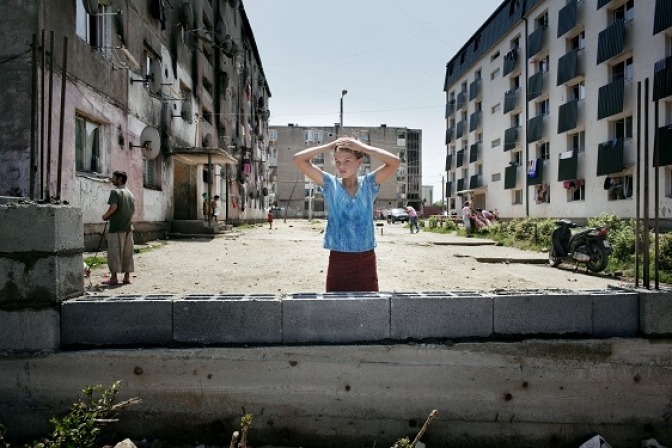In a recent hearing (October 14) in the European Parliament the situation of Roma as victims of forced evictions in Europe was discussed. The hearing was organized by a number of NGOs and MEPs from all major party groups. Forced evictions of Roma are a traditional expression of Anti-Gypsyism despite anti-discrimination legislation and actions plans for integration of Roma.
Four EU member states were named and shamed at the hearing - Bulgaria, France, Italy and Hungary – but forced evictions happen also in other member states.
In Bulgaria, local tensions in May and June 2015 between Roma and non-Roma turned into mass protests over what was described as theft and ‘illegal’ Roma housing in Garmen, a village in southwest Bulgaria, and in Orlandovzi, a neighborhood in Sofia. Hundreds of protesters demanded that the Bulgarian government demolish the ‘illegal’ Roma houses and that they expel Roma.
To placate the protesters, the government began to demolish 124 houses inhabited by Roma in Garmen and 14 in Orlandovzi. Despite calls from the European Court of Human Rights, the Bulgarian government decided to continue with the demolition of houses without ensuring that human rights safeguards were met.
As a result hundreds of people, including minors, have been left homeless. Only a few of the evicted people have been offered alternative housing in an overcrowded social center under very bad conditions. On September 15, the government announced that forced evictions will take place in another town in southern Bulgaria.
In France, on August 27, the Le Samaritain settlement in La Courneuve in Paris was dismantled by the French police without prior warning, leaving nearly 80 Roma families homeless. Only a few people, who were pre-identified as particularly vulnerable, were rehoused in emergency centers for 3 days.
No alternative housing has been offered to the other 150 people, which is in breach of a 2012 Ministerial Circular. The European Roma Right Centre (ERRC) reports that French authorities forcibly evicted more than 21,537 Romani EU citizens from other Member States in 2013 - twice as many as in 2012. During the first half of 2015, France forcibly evicted 3,947 Roma.
The French Ombudsman, La Voix des Rroms, the Abbé Pierre Foundation and Médecins du Monde have highly criticized the forced evictions in France.
Besides violating human rights, the eviction policy is costly. A recent report by The National Human Rights Collective Romeurope estimated that 30 – 40 million euros had been spent on evictions in France in 2014 – ten times more than the money earmarked for resettlement projects.
In Italy, despite the formal closure of the so-called “Nomad Emergency” in 2013, Roma and Sinti communities are still being forcibly evicted from their dwellings throughout the country. Systematic campaigns of forced evictions have been carried out by the authorities in the cities of Rome and Milan.
In 2013, the authorities of Rome carried out 54 documented forced evictions, affecting around 1,230 Roma. So far this year a further 69 such evictions have been carried out in the Italian capital, affecting 1,008 people.
When evicting Roma and Sinti families, the Italian authorities rarely apply all the procedural protections foreseen by international human rights instruments. The affected families have no access to legal remedy. In most of the documented cases, the evictions have been carried out without formal eviction orders and without any kind of consultation.
In Hungary, the mayor of Miskolc in Hungary has announced that the city will eradicate its Roma shanty towns. In July 2015 around 450, mainly Roma families from the ‘Numbered Streets’ neighborhood, were asked to vacate their homes or they would be evicted.
The tenants are offered compensation (approximately €6,450) to purchase a property outside of the city on the condition that they do not sell or remortgage it for five years. However, the Supreme Court in Hungary has ruled that the regulations which oblige tenants to move outside the territory of a city and terminates tenancy agreement in exchange for monetary compensation are unlawful.
How to stop illegal evictions
The targeting of a minority with measures such as systematic evictions violates international human rights standards and European Union anti-discrimination law. According to the NGOs, evictions should be carried out as a last resort and in line with European and international human rights safeguards.
Nobody should be rendered homeless following an eviction; authorities should provide alternative adequate housing, in consultation with the affected people. These obligations extend to all tiers of government including city authorities. Across Europe, authorities have failed to comply with these safeguards, with the majority of victims of forced evictions left homeless.
Stefan Olsson, newly appointed director at DG Employment, Social Affairs and Inclusion, said at the hearing that if member states are not meeting the conditions for funding Roma projects, the Commission will stop the funding.
Andreas Stein, head of the unit for Equality Legislation at DG Justice and Consumers, added that the Commission is considering launching infringement procedures against member states as regards housing but only if there is strong evidence that the Roma minority is treated differently compared to the majority population.
As a result of the hearing, the NGOs will prepare a letter to the European Commission, underlining that the evictions breach EU law and that EU funds should be used to stop and prevent evictions. The NGOs will also send written recommendations to the Parliament and encourage it to keep up the pressure on the Commission and Member States.
M. Apelblat
The Brussels Times
EU member states discriminate Roma in housing: Families are forcibly evicted from their homes

